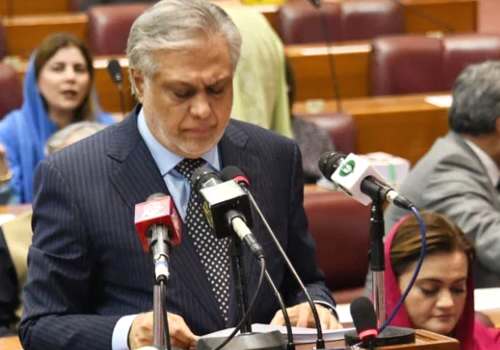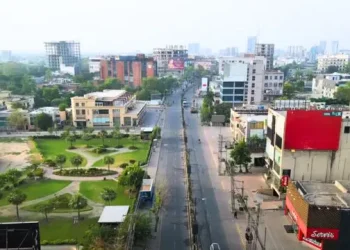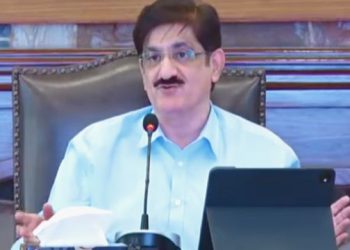ISLAMABAD: Finance Minister Ishaq Dar presented the budget for the financial year 2023-24 in the National Assembly, amounting to 144 trillion 60 billion rupees.
Key Highlights of the Budget
Allocation of 11.50 billion rupees for development projects, marking a historic amount.
Increase in defense expenditure to 18 trillion 4 billion rupees.
Estimated revenue of 92 trillion rupees from the Federal Board of Revenue (FBR) and share of 52 trillion 76 billion rupees for provinces.
Total federal government expenditure of 144 trillion 60 billion rupees, with 73 trillion 3 billion rupees for interest payments.
FBR’s target of 92 trillion rupees for tax collection, with direct tax collection projected at 37 trillion 59 billion rupees and indirect taxes at 54 trillion 41 billion rupees.
9.50 billion rupees allocated to the Public Sector Development Program (PSDP), reaching a historic high of 11 trillion 50 billion rupees through public-private partnerships.
Increase in salaries for government employees, with a 35% hike for grades 1 to 16 and a 30% increase for grades 17 to 22.
Infrastructure and Development Projects
Allocation of funds for various infrastructure projects, including the Dasu Power Project, Jamshoro Power Plant, Mohmand Dam, and Diamer Bhasha Dam.
Substantial funds for transportation, water supply, energy projects, and the development of former FATA districts, Azad Kashmir, and Gilgit-Baltistan.
Allocations for education and healthcare sectors, with 82 billion rupees for education and higher education and 26 billion rupees for the health sector.
Health Insurance Cards for Journalists and Artists
Issuance of health insurance cards for journalists and artists.
Funds allocated for the welfare of minorities, sportspersons, and students, as well as the establishment of a pension fund.
Growth and Inflation Estimates
Projected economic growth rate of 3.5% and inflation rate of 21% for FY 2023-24.
Budget deficit expected to be 6.54% with a primary surplus of 0.4% of GDP.
Export target set at $30 billion, and remittance target at $33 billion.
Minimum Pension and Wage Increases
Increase in minimum pension to 12,000 rupees and minimum wage to 32,000 rupees in the federal limits.
Increase in pension for pensioners receiving benefits through the Employees Old Age Benefit Institute (EOBI) to 10,000 rupees.
Budget Allocation for Benazir Income Support Program (BISP) Increased
Increase in the budget for the Benazir Income Support Program (BISP) from 360 billion to 400 billion rupees.
Tax Reforms and Incentives
Abolition of a 2% tax on remittance-based property purchase.
Introduction of the “Diamond Card” for remittance cardholders.
Incentives for overseas Pakistanis, including priority access to Pakistani embassies and consulates and fast-track immigration facilities at Pakistani airports.
Increased tax rate for non-filers withdrawing over 50,000 rupees from banks.
Increased tax rate on wealthy individuals employing foreign workers.
Tax benefits announced for freelancers in the IT and IT services sector.
Agricultural Sector and Renewable Energy
Increased limit for agricultural loans and allocation of funds to convert agricultural tube wells to solar power.
Abolishment of taxes and duties on quality seeds and exemptions for rice production equipment.
Customs duty exemption on solar panels and other renewable energy equipment.
Other Notable Proposals
– Removal of limitations on duties and taxes for old and used vehicles above 1300 cc made in Asia.
– Reduction in federal excise duty on telecom services.
– Allocation of funds for higher education, the Pakistan Endowment Fund, laptop scheme, and sports development.
(Islamabad51-Newsdesk)














